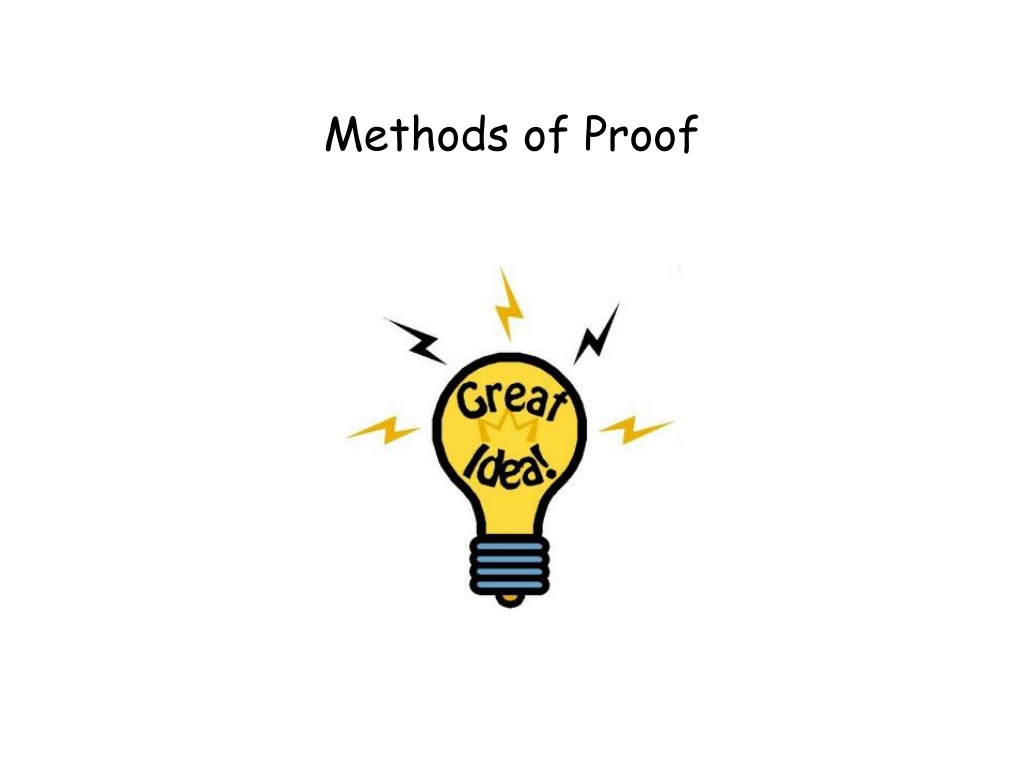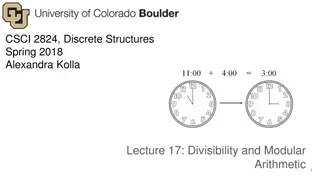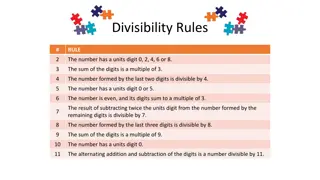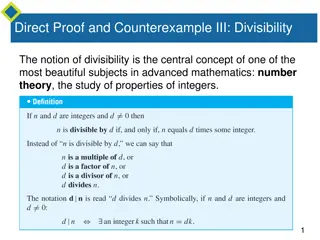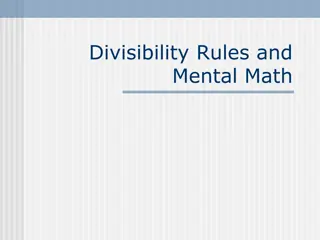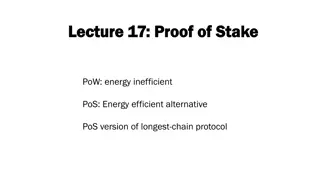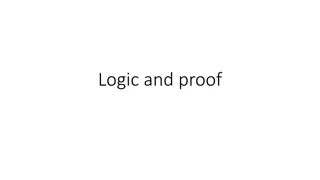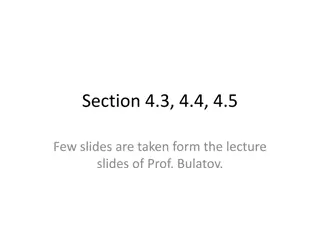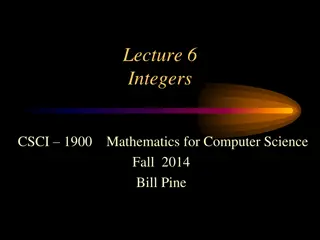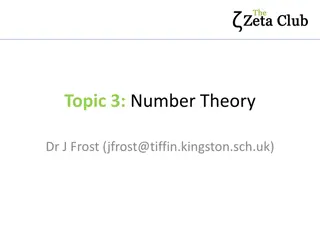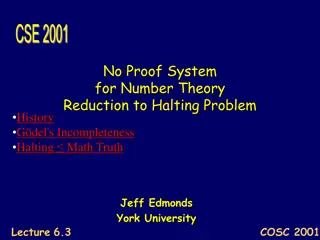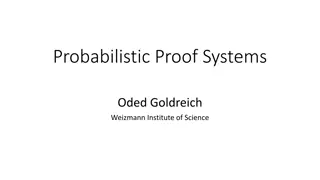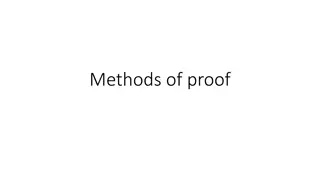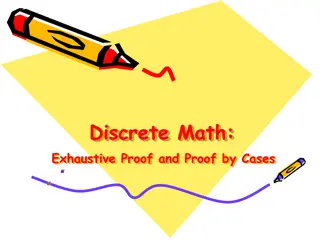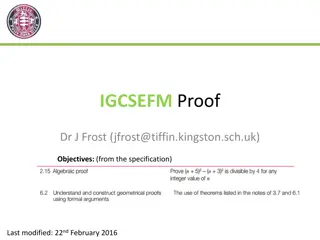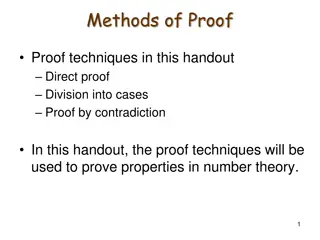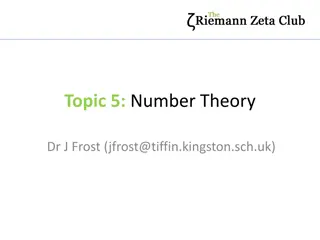Mathematical Proof Methods and Divisibility Rules
In this lesson, we explore various methods of proof in mathematics, including direct proof, contrapositive, proof by contradiction, and proof by cases. We delve into basic definitions of even and odd numbers and learn about proving implications. Additionally, the concept of divisibility, prime numbers, and simple divisibility facts are covered to enhance understanding of mathematical proofs.
Download Presentation

Please find below an Image/Link to download the presentation.
The content on the website is provided AS IS for your information and personal use only. It may not be sold, licensed, or shared on other websites without obtaining consent from the author. Download presentation by click this link. If you encounter any issues during the download, it is possible that the publisher has removed the file from their server.
E N D
Presentation Transcript
This Lecture Now we have learnt the basics in logic. We are going to apply the logical rules in proving mathematical theorems. Direct proof Contrapositive Proof by contradiction Proof by cases
Basic Definitions An integer n is an even number if there exists an integer k such that n = 2k. An integer n is an odd number if there exists an integer k such that n = 2k+1.
Proving an Implication Goal: If P, then Q. (P implies Q) Method 1: Write assume P, then show that Q logically follows. Claim: If , then Reasoning: When x=0, it is true. When x grows, 4x grows faster than x3in that range. Proof: When
Direct Proofs The sum of two even numbers is even. x = 2m, y = 2n x+y = 2m+2n = 2(m+n) Proof The product of two odd numbers is odd. x = 2m+1, y = 2n+1 xy = (2m+1)(2n+1) = 4mn + 2m + 2n + 1 = 2(2mn+m+n) + 1. Proof
Divisibility a divides b (a|b): b = ak for some integer k 5|15 because 15 = 3 5 n|0 because 0 = n 0 1|n because n = 1 n n|n because n = n 1 A number p > 1 with no positive integer divisors other than 1 and itself is called a prime. Every other number greater than 1 is called composite. 2, 3, 5, 7, 11, and 13 are prime, 4, 6, 8, and 9 are composite.
Simple Divisibility Facts 1. If a | b, then a | bc for all c. 2. If a | b and b | c, then a | c. 3. If a | b and a | c, then a | sb + tc for all s and t. 4. For all c 0, a | b if and only if ca | cb. Proof of (1) a | b b = ak bc = ack bc = a(ck) a|bc a divides b (a|b): b = ak for some integer k
Simple Divisibility Facts 1. If a | b, then a | bc for all c. 2. If a | b and b | c, then a | c. 3. If a | b and a | c, then a | sb + tc for all s and t. 4. For all c 0, a | b if and only if ca | cb. Proof of (2) a | b => b = ak1 b | c => c = bk2 => c = ak1k2 => a|c a divides b (a|b): b = ak for some integer k
Simple Divisibility Facts 1. If a | b, then a | bc for all c. 2. If a | b and b | c, then a | c. 3. If a | b and a | c, then a | sb + tc for all s and t. 4. For all c 0, a | b if and only if ca | cb. Proof of (3) a | b => b = ak1 a | c => c = ak2 sb + tc = sak1+ tak2 = a(sk1+ tk2) => a|(sb+tc) a divides b (a|b): b = ak for some integer k
This Lecture Direct proof Contrapositive Proof by contradiction Proof by cases
Proving an Implication Goal: If P, then Q. (P implies Q) Method 1: Write assume P, then show that Q logically follows. Claim: If r is irrational, then r is irrational. How to begin with? What if I prove If r is rational, then r is rational , is it equivalent? Yes, this is equivalent; proving if P, then Q is equivalent to proving if not Q, then not P .
Rational Number R is rational there are integers a and b such that numerator and b 0. denominator Is 0.281 a rational number? Yes, 281/1000 Yes, 0/1 Is 0 a rational number? If m and n are non-zero integers, is (m+n)/mn a rational number? Yes Yes, a/b+c/d=(ad+bc)/bd Is the sum of two rational numbers a rational number? Note that 100x-x=12, and so x=12/99. Is x=0.12121212 a rational number?
Proving an Implication Goal: If P, then Q. (P implies Q) Method 2: Prove the contrapositive, i.e. prove not Q implies not P . Claim: If r is irrational, then r is irrational. Proof: We shall prove the contrapositive if r is rational, then r is rational. Since r is rational, r = a/b for some integers a,b. So r = a2/b2. Since a,b are integers, a2,b2 are integers. Q.E.D. Therefore, r is rational. (Q.E.D.) "which was to be demonstrated", or quite easily done .
Proving an if and only if Goal: Prove that two statements P and Q are logically equivalent , that is, one holds if and only if the other holds. Example: An integer is even if and only if the its square is even. Method 1: Prove P implies Q and Q implies P. Method 1 : Prove P implies Q and not P implies not Q. Method 2: Construct a chain of if and only if statement.
Proof the Contrapositive An integer is even if and only if its square is even. Method 1: Prove P implies Q and Q implies P. Statement: If m is even, then m2is even Proof: m = 2k m2= 4k2 Statement: If m2is even, then m is even m2= 2k Proof: m = (2k) ??
Proof the Contrapositive An integer is even if and only if its square is even. Method 1 : Prove P implies Q and not P implies not Q. Statement: If m2is even, then m is even Contrapositive: If m is odd, then m2is odd. Proof (the contrapositive): Since m is an odd number, m = 2k+1 for some integer k. So m2= (2k+1)2 = (2k)2+ 2(2k) + 1 So m2is an odd number.
This Lecture Direct proof Contrapositive Proof by contradiction Proof by cases
Proof by Contradiction F P P To prove P, you prove that not P would lead to ridiculous result, and so P must be true. You are working as a clerk. If you have won the lottery, then you would not work as a clerk. You have not won the lottery.
Proof by Contradiction Theorem: is irrational. 2 Proof (by contradiction): Suppose was rational. Choose m, n integers without common prime factors (always possible) such that n 2 m = 2 Show that m and n are both even, thus having a common factor 2, a contradiction!
Proof by Contradiction Theorem: is irrational. 2 Proof (by contradiction): Want to prove both m and n are even. m = 2 m l so can assume = 2 n = = 2 2 4 m l n = 2 m 2 2 2 4 n l n = 2 2 2 m n = 2 2 2l so m is even. so n is even.
Infinitude of the Primes Theorem. There are infinitely many prime numbers. Proof (by contradiction): Assume there are only finitely many primes. Let p1, p2, , pNbe all the primes. We will construct a number N so that N is not divisible by any pi. By our assumption, it means that N is not divisible by any prime number. On the other hand, we show that any number must be divisible by some prime. It leads to a contradiction, and therefore the assumption must be false. So there must be infinitely many primes.
Divisibility by a Prime Theorem. Any integer n > 1 is divisible by a prime number. Let n be an integer. If n is a prime number, then we are done. Otherwise, n = ab, both are smaller than n. If a or b is a prime number, then we are done. Otherwise, a = cd, both are smaller than a. If c or d is a prime number, then we are done. Otherwise, repeat this argument, since the numbers are getting smaller and smaller, this will eventually stop and we have found a prime factor of n. Idea of induction.
Infinitude of the Primes Theorem. There are infinitely many prime numbers. Proof (by contradiction): Let p1, p2, , pNbe all the primes. Consider p1p2 pN+ 1. Claim: if p divides a, then p does not divide a+1. Proof (by contradiction): a = cp for some integer c a+1 = dp for some integer d => 1 = (d-c)p, contradiction because p>=2. So none of p1, p2, , pNcan divide p1p2 pN+ 1, a contradiction.
This Lecture Direct proof Contrapositive Proof by contradiction Proof by cases
Proof by Cases e.g. want to prove a nonzero number always has a positive square. x is positive or x is negative if x is positive, then x2> 0. if x is negative, then x2> 0. x2> 0.
The Square of an Odd Integer Idea 0: find counterexample. 32= 9 = 8+1, 52= 25 = 3x8+1 1312= 17161 = 2145x8 + 1, Idea 1: prove that n2 1 is divisible by 8. n2 1 = (n-1)(n+1) = ?? Idea 2: consider (2k+1)2 (2k+1)2= 4k2+4k+1 If k is even, then both k2and k are even, and so we are done. If k is odd, then both k2and k are odd, and so k2+k even, also done.
Trial and Error Wont Work! Fermat (1637): If an integer n is greater than 2, then the equation an+ bn= cnhas no solutions in non-zero integers a, b, and c. has no solutions in non-zero integers a, b, and c. Claim: False. But smallest counterexample has more than 1000 digits. Euler conjecture: has no solution for a,b,c,d positive integers. Open for 218 years, until Noam Elkies found + + = 4 4 4 4 95800 217519 414560 422481
The Square Root of an Even Square Statement: If m2is even, then m is even Contrapositive: If m is odd, then m2is odd. Proof (the contrapositive): Since m is an odd number, m = 2l+1 for some natural number l. So m2= (2l+1)2 = (2l)2+ 2(2l) + 1 So m2is an odd number. Proof by contrapositive.
Rational vs Irrational Question: If a and b are irrational, can abbe rational?? We know that 2 is irrational, what about 2 2? Case 1: 2 2is rational Then we are done, a= 2, b= 2. Case 2: 2 2is irrational Then ( 2 2) 2 = 22= 2, a rational number So a= 2 2, b= 2 will do. So in either case there are a,b irrational and abbe rational. We don t (need to) know which case is true!
Summary We have learnt different techniques to prove mathematical statements. Direct proof Contrapositive Proof by contradiction Proof by cases Next time we will focus on a very important technique, proof by induction.
